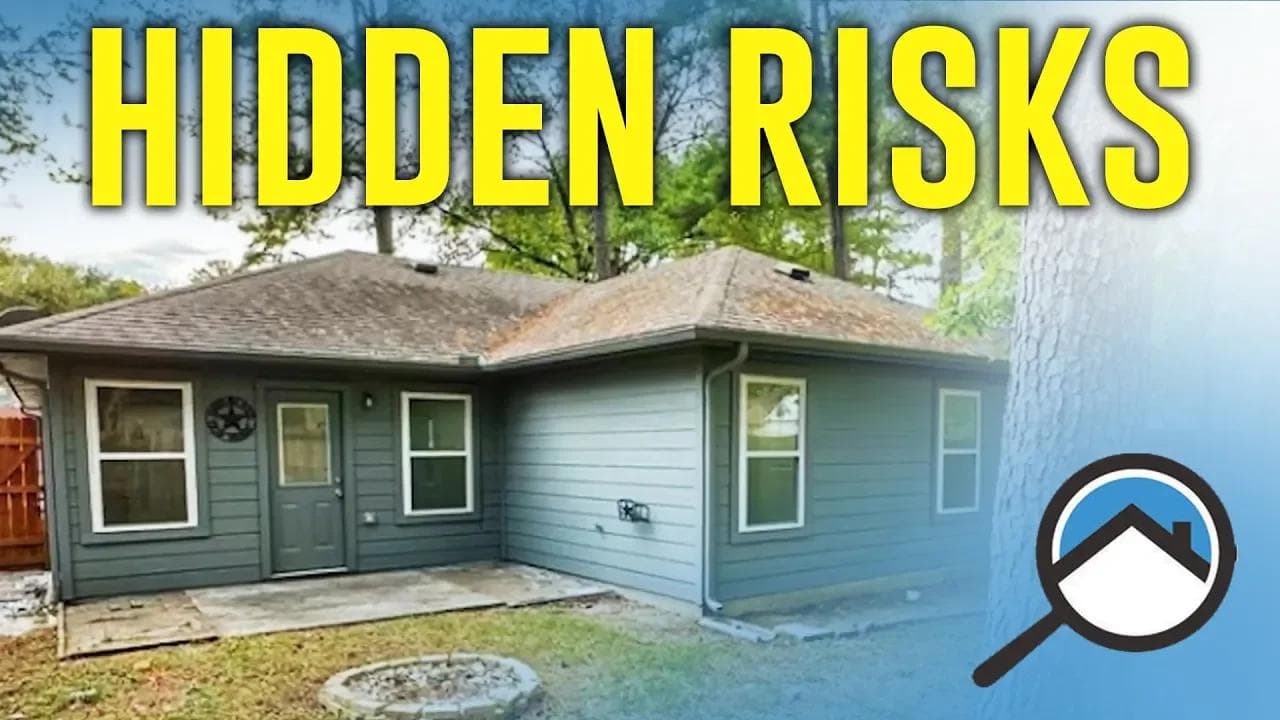Listen or watch on YouTube
In This Episode
Hosts: Bob Frady & John Siegman
Property: 25314 Laurel Green St, Spring, TX 77373
Topics: homebuyingtips homeinspection houseforsale
Episode Summary
Home inspections are essential, but they don’t catch everything. In this episode, Bob and John tackle a common question: Why not just hire an inspector? While inspections provide valuable insights, they often come too late—after you've already made an offer and emotionally committed to the home.
Bob and John discuss how PropertyLens can help you spot potential red flags before you buy, from roof age and hurricane damage to flood zones and termite risks.
Key Takeaways
✅ Always check for flood risk, even if a property isn't in a designated flood zone.
✅ Don't rely solely on real estate listings; conduct thorough due diligence.
✅ Consider the age of the property and potential issues with plumbing, electrical, and roofing.
✅ Ask the right questions about termite and mold inspections.
✅ Ensure adequate insurance coverage, especially for flood and replacement costs.
✅ Utilize PropertyLens to uncover hidden property risks and make informed decisions.
Resources
🔹 Try it: Propertylens.com
🔹 Questions? Contact us: support@propertylens.com
Transcript
[00:00:00] Bob Frady: Hey there everybody. I am Bob Frady and with me
[00:00:11] John Siegman: Is John Siegman.
[00:00:12] Bob Frady: We are the co-founders of PropertyLens and John, I wanted to talk to you about something. I get a lot of comments on social media and stuff about, well, why don't you just hire an inspector to look for all this stuff that's contained in your property loans report?
[00:00:30] So John, why don't you just hire an inspector?
[00:00:35] John Siegman: Well, you should. You should never get a house without an inspection. That's too risky, but you know, an inspector is not perfect. They know a lot of stuff. They're very good at what they do. But you want to have the list. The other part of the problem is the inspection typically comes after you've made an offer.
[00:00:57] Bob Frady: Yep. Yep. You're already pot committed. You're pot committed. You're already in love. And now you're trying to figure out reasons to potentially back away. That's a terrible time.
[00:01:08] You know, it's a terrible time because you find this house, you fall in love with it, and then you have to figure out, okay, what's hiding in here that's going to cause me to fall out of love with it. It's a bad situation for the buyer. You know, and the seller knows you're committed to making it at work and then you're negotiating and all that stuff.
[00:01:29] Wouldn't it be better to know most of that stuff up front?
[00:01:32] John Siegman: I would think so. You know, you don't want to get down the aisle and, you know, place all of the furniture in your head as to where it's going to go and then find out that, oh, it's got a cracked foundation.
[00:01:47] It's got a bad roof. You know, most people who are buying houses are not construction experts.
[00:01:55] Bob Frady: Yep. And, listen, every house, 99% of the houses in the U. S. are used houses, you know, somebody else has already lived there once. So okay, maybe it's 98. 7%, but pretty close to 99% are used houses. And why not get a house history report?
[00:02:13] Let's give you an idea of what it looks like. So you know, here's a location in Texas. This is what we call the InspectorLens and the job of this. Now, listen, what we would love to see is that you get a PropertyLens report before you ever make an offer, because that's when you can most fully inform yourself and ask the seller a whole bunch of questions, but let's say you've made an offer, then you hand this InspectorLens to the inspector to say, Hey, make sure you check out these things as well.
[00:02:48] Pay special attention to these things because the PropertyLens report is telling me You got to check out these things. So for this location on Laurel green street in spring, Texas, which is for sale. There was a hurricane event in 2017 and it was a bad one. There was moderate damage to the property, according to government task force resources.
[00:03:14] So you want to make sure you're digging in and looking for signs of water and hurricane damage. Water damage in the basement or crawl space, damage to the electrical and HVAC systems. Damage to the roof. Is the roof securely attached to the frame? Look for any mitigation work that's happened. You know, check the repairs up to local codes and consider performing a mold test.
[00:03:38] And there's also mold in this area, so I probably always try to do a mold test. That's the kind of stuff that we're saying, Hey, just make sure you check this. Take an extra look at it. You know, what else, John, what else are we going to look at if, tell the inspector to look at it?
[00:03:54] John Siegman: Well, you want them to take, definitely take a look at the roof.
[00:03:57] You know, we're estimating the age is 23 years old and it's past the end of its standard life. What's going on here? Because that could be a $13,000 expense for you that you're not ready for.
[00:04:10] Bob Frady: In Texas, if the roof is more than 7 years old, you switch to cost value, actual cash value, rather than replacement cost, unless you pay extra into your insurance.
[00:04:24] So, and it's a 2 percent deductible for the roof. So if this house is $270,000, it's $5,400 that you're going to have to write a check for, sooner rather than later, on this property. So you want the inspector to get up there, crawl around, make sure it's in good shape. And then our friends, the termites, have there been any hazards around or they've been tented?
[00:04:45] Does this place look like it has some termite infestation? Termite remediation is relatively straightforward, but it's not something you want to do after you've moved in. You want to do it before you move in.
[00:04:58] John Siegman: Something the seller should pay for. It's a hundred year flood zone. You're going to need flood insurance if you have a mortgage on this house.
[00:05:05] You're going to need it, that's an extra expense. and there's no way, you know, without the inspector looking this up. That they would know that. So we've already done that work for you. Note the presence of any previous blood remediation work. You know, in a previous episode we had an expert come in and note that.
[00:05:26] If you notice that all of the electrical outlets are now at five feet, property's probably been flooded previously.
[00:05:34] Bob Frady: Yep. You know, and it's an older house. I'm 23 years old. Check on the water heater. Of course, most inspectors are going to do that. But it's just a reminder. Make sure you make a check for these things.
[00:05:48] You know, when I had my house inspected, they don't normally do a radon test in the house. I had to ask for that. And when I asked for it, it came back eliminated. This is designed to alert you to things that might cause you to negotiate differently on the purchase of the house. When talking about PropertyLens and inspectors, what are the three things that you would remind people of?
[00:06:16] John Siegman: One, always get an inspection and hand the list to your inspector because it will give them an extra thing to go on. And inspectors, if you use this report, You can point out extra services that you can sell. That would be my first thing.
[00:06:35] The second thing is, I want to know all of this stuff up front before I fall in love with the house. Because I want to know what to look for, what I need to be concerned about. You know, I don't want to go placing furniture in my head in all of the rooms and then come to say, Yeah, we're not moving there. Let's know all of that stuff up front. For me, knowing that this house is in a flood zone, I'm out. I don't want to deal with that.
[00:07:07] So, those would be the things that I would be looking for. What about you?
[00:07:13] Bob Frady: I would say, I would agree with you. Always get an inspection. However, sometimes you can't. The market's competitive. So in a situation where you have to bypass the inspection, get it inspected right after. You buy that, buy the property right after you close, then you get the inspection.
[00:07:33] But here's the three things I would think about when it comes to PropertyLens and inspectors. Number one, the best combination is PropertyLens plus an inspector because PropertyLens will highlight things that should be taken extra looks at and the inspector can go do those extra looks for you. The second thing though is that inspections generally come after you've made the offer on a property.
[00:07:57] You're already pot committed. Wouldn't it be better to know this stuff up front? And the third is that inspectors are paid by the seller. And not by the buyer. I've had situations where I've sold a house and we've had the inspector come through and the agents talk to each other and go. Maybe we shouldn't say it quite in this language, maybe we should change it to this.
[00:08:20] You want to get a good inspection, not the one that just helps grease the deal. Giving these questions to the inspector will help them, help you to make sure that your investment is going to be a good one. We love inspectors at PropertyLens. Don't ever get a property without getting an inspection whenever possible.
[00:08:44] So, John, anything else to add?
[00:08:47] John Siegman: No, I think that's it.
[00:08:49] Bob Frady: All right, for PropertyLens, I'm Bob Frady.
[00:08:51] John Siegman: I'm John Siegman.
[00:08:53] Bob Frady: Until next time.



